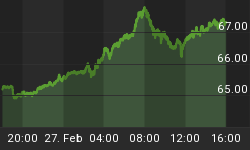The inflation/deflation question continues to be one of the most debated topics in finance. Whether the US experiences inflation or deflation, and in what order, are two key questions on the minds of today's investors, with the answer to these questions impacting the investments individuals choose to hold in anticipation of one of the outcomes.
Governments and their central banks control the money printing presses. It is their expansion of the supply of money and credit that creates monetary inflation. The rate of that expansion typically determines the degree of inflation and how serious a problem that develops. Like a Tour de France cyclist's steroid cocktail, this statistic is usually a well guarded secret, since it cheats many out of their purchasing power and lifelong savings.
Therefore, let's forget this notion that the US Federal Reserve fears inflation. If they feared it, they would have renamed it; notice how the dreaded "deflation" has been coined "dis-inflation" in recent years. The Federal Reserve - and all central banks for that matter - is the engine of inflation, period. That is who they are. And that is how their elected friends in Washington D.C. like it.
Deflationists argue that if the dollar were allowed to slide towards worthlessness against other currencies and gold, the US and its ruling elites effectively destroy themselves by eliminating the source of their great wealth. In an effort to avoid that outcome, it is argued that interest rates would have to rise significantly in a last ditch effort to save the currency, bringing on economic contraction, collapsing credit, massive bankruptcies and high levels of unemployment - the hallmarks of a Kondratieff winter.
While this deflationist argument does have merit on the surface - we in all likelihood get deflation at some point - it appears to be nothing more than an Epimenides paradox. If the deflationist scenario of raising interest rates in the hope of saving a falling dollar were to actually occur, one fails to see how the debt that ultimately remains gets serviced during a period of deep economic contraction. Furthermore, new borrowing would be needed to pay the interest on outstanding debt as well as the needs of a government with falling tax revenue.
However, the last thing anyone will want to do is lend the US new money at that point. As an increasing number of foreign US debt holders realize no bailout was on the way, they would in all likelihood dump their holdings for any amount of US dollar cash they could receive from those sales, and proceed to dump those US dollars as well. That type of selling on the foreign exchange markets would trigger even more selling, bringing on the exact same result the raising of interest rates was initially designed to avoid, only faster. Like a destructive tornado propelling anything it grabs a hold of up into the sky, all those US dollars coming back home at once would similarly take prices up into the stratosphere.
A separate consideration is that Chinese reserves recently surpassed the one trillion dollar mark. If like Americans they have a similar penchant for nice round numbers, they most certainly have a doozy here staring them in the face. With the 2008 Beijing Olympics just around the corner, and with their stated goal of becoming the clear number one atop the sporting world in terms of gold medal count - China is entering all major competitions leading up to 2008 with the stated goal of dominating events and amassing maximum gold medals - they are well on their way to showcasing their country to the world as a superpower in every way.
Chinese officials have also indicated they will not restrict foreign journalist movement within the country, and will also not restrict who journalists may or may not speak with.
What that suggests to me, among other rumblings of late, is that the Chinese will allow their currency to rise against the US dollar in the next year and a half leading up to the Olympics. The Chinese are master strategists, and I suspect they would want their citizens to be in a position to celebrate the exploits of their countrymen and women alongside the foreign tourist. The last thing China would want to see is a foreign journalist reporting that the new superpower's average citizen couldn't even afford the cheapest of tickets.
When this all sets in and markets realize the US dollar is doomed is anyone's guess. Although I believe we are pretty late in the game, there is no telling when some crazy bulls - the two legged pom-pom waving Wall Street kind - will streak naked across the playing field, delaying this game even further. What should be clear as day however is that unlike the drunken fools who can put their shirts back on, these particular fools will end up losing theirs.
To learn how to preserve your wealth and protect your purchasing power, I suggest that you download a free copy of Euro Pacific Capital's research report entitled "The Collapsing Dollar; The Powerful Case for Investing in Foreign Equities" available at www.researchreport1.com.















